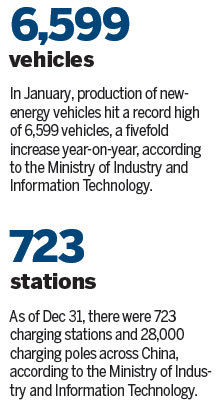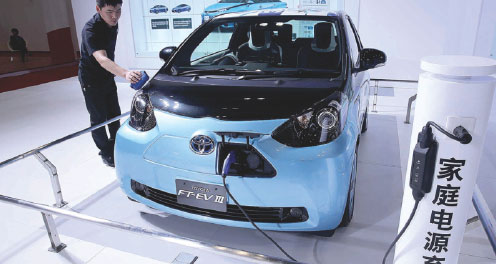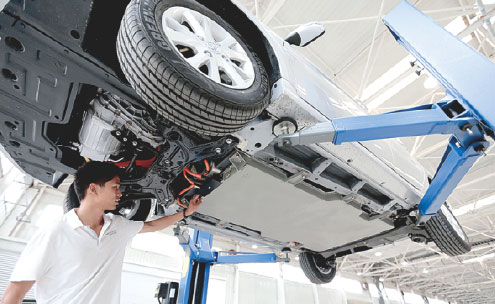Poor facilities pulling the plug on electric cars
Updated: 2015-02-16 07:59
By Zheng Jinran(China Daily)
|
||||||||
'Green' vehicles are proving popular in China, but their growth is being undermined by an immature infrastructure and a lack of charging stations, as Zheng Jinran reports.
Li Yongning is a regular visitor to the Huamao Center, a busy business cluster in the Chaoyang district of Beijing that houses famous designer outlets, high-end jewelry shops, and fine restaurants.
However, the 59-year-old Beijinger isn't interested in clothing, fine furniture, or haute cuisine. Instead, he visits the center every few days to charge his son's electric car, a Chinese-made BYD E6, which until recently was a headache rather than the help it was intended to be.
"It's impossible to charge the vehicle near our community because there are no suitable charging poles," Li said. "Until the center opened we had to drive more than 40 kilometers to the 4S store where we bought the car, so it took about six hours every time we wanted to charge it."
The car, which the makers claim has a range of about 300 km per charge, has been a source of headaches since it was purchased five months ago, and Li's son even had to arrange for it to be towed to a charging station after the battery ran out unexpectedly en route, despite registering 30 percent power.
"My son bought the car because it's much easier to get a license plate for new-energy vehicles in Beijing and he needed a car to ferry his newborn baby around," Li said, "But most of the time, it's just been an expensive decoration in the garage."
According to Yu Bo, head of operations at Tellus Power Inc, which built Beijing's largest public charging station, new-energy vehicles are popular with young, middle class people, such as Li's son, both at home and abroad, but the charging issue has become a pervasive problem.
The 100 charging poles in the station at the Huamao Center, which opened on Jan 19, can charge all existing alternative-fuel vehicles, including the imported Tesla Model S and other big-name brands.
"We chose to locate the station at the Huamao Center because it's an upscale community that's home to a large number of wealthy, middle-class young people," Yu said, adding that the company's research indicated at least 200 alternative-fuel vehicles, including imported luxury brands, within a 5-km radius of the center.
Yu said it usually takes about 20 minutes to fully charge a car such as the E6, and each kilowatt-hour costs members 0.8 yuan, meaning that Li's son pays about 45 yuan ($7) in total. For Li, however, the charging fee is irrelevant so long as the car spends more time on the road than in the garage.
Growing popularity
Despite the dearth of charging facilities, more than 74,000 new-energy vehicles were sold in China last year, a rise of 320 percent from 2013, according to the China Association of Automobile Manufacturers. The country is now the world's largest market for green vehicles.
Meanwhile, data released by the Ministry of Industry and Information Technology show that Chinese production hit a record high of 6,599 vehicles in January, a fivefold rise year-on-year.
Automakers and industry experts attribute the surge in popularity to a raft of favorable government policies, such as the waiving of purchase taxes on electric cars until Dec 2017, and central and local government subsidies, ranging from 35,000 yuan to 60,000 yuan per vehicle, that were introduced in September. The ministry said 39,400 electric vehicles were sold between September and December.
Karsten Engel, head of China operations at BMW Group, said amendments to local policies and the adoption of German charging standards have boosted sales of both Chinese-made and imported new-energy vehicles. Also, since January, BMW and the Shanghai municipal government have been offering free license plates to purchasers of the company's alternative-fuel range.
Growing public acceptance of new-energy vehicles, along with the favorable policies and higher awareness of environmental issues, has fueled optimism about future sales. At a recent conference on the development of green motoring, Ouyang Minggao, a professor at the Department of Automotive Engineering at Tsinghua University, estimated that Chinese sales could overtake the US this year, arguing that the recent fall in the price of crude oil and the knock-on effect at gas stations are likely to see sales of green vehicles slump in the US.
The growing popularity of alternative-energy cars has prompted China to construct more charging facilities, and as of Dec 31, there were 723 charging stations and 28,000 charging poles across the country, according to the ministry.
However, there are still far too few charging facilities, and some industry observers are concerned that the shortfall will hamper wider adoption of new-energy vehicles. Tang Jie, who manages the new-energy vehicle department at Beijing Yinjian Car Rental Co, one the capital's biggest cabs companies, said drivers of the company's first batch of 500 new-energy taxis have been complaining about the difficulty of finding charging stations since the fleet started operating in December.
"The period spent charging the car leaves taxi drivers less time to make money, and the scarcity of charging poles limits the scope of their business, because they need to stay within range of the existing pole network," he said.
For Pang Lei, CEO of Tellus Power, it's a "chicken-and-egg problem" - the lack of charging poles has hampered the development of new-energy vehicles, and that slow rate of development has made investors increasingly reluctant to finance the construction of charging stations.
Yu said the 100 poles the company fitted in the Huamao Center cost 13 million yuan to install, "but we need to break the ice by building more charging facilities". He added that by the end of the year, there will be 3,500 charging poles in Beijing, and by the end of 2107, the number will have risen to 19,000, which should satisfy demand.
Unprofitable
While cheap charging has proved popular with drivers, it's created a problem for public utilities and other companies because they're unable to recoup the heavy investment they've plowed into the construction of facilities.
Charging stations built by State Grid Corp have yet to turn a profit, and seven stations operated by its subsidiary in southern China reported a full-year loss of 13 million yuan, according to Chinese Science News on Jan 28.
Sun Fengchun, deputy head of the Beijing Institute of Technology, said the losses are a necessary step in the development of the new sector, and profits will come later down the line when vehicle sales begin to match those of conventional cars.
Tellus Power's Pang said it would take about five to seven years to recover the company's massive investment in the market, while Yu said Tellus would rely on its new-energy vehicle rental service to enhance revenue flow.
Individual automakers, such as Tesla from the US, are also attempting to kick-start the market by providing convenient charging facilities. Tesla, which built the biggest charging network in China - its largest market outside the US - said 90 percent of its buyers in China have charging facilities at home, but it has also built more than 200 "supercharging stations" nationwide to provide quick and efficient charging. Overall, the number of "destination charging poles", which are installed at popular sites such as shopping malls so drivers can recharge their cars while they shop or engage in other activities, will rise to 1,000 by the end of the year, it said.
The cooperation between Tesla and real estate companies has proved beneficial for the companies and motorists, and now other automakers are examining ways to expand the charging network nationwide and further push sales of new-energy vehicles.
Although the process will take time, Yu of Tellus Power said the company is optimistic about the future of green motoring in China: "It will take years to build an improved charging network, but the company is determined to promote these environmentally friendly, efficient vehicles, and push forward the green transport model for the good of the environment and people's health."
Contact the writer at zhengjinran@chinadaily.com.cn

|
Homeowners can install private charging poles for new-energy cars, such as this one on display at the International Energy Conservation and Environmental Protection Exhibition in Beijing. The lack of charging poles has been a major obstacle to the development of new-energy vehicles in China. Chen Ming / for China Daily |
|
An employee of Beijing Automotive Industry Group inspects the battery of a new-energy car. In recent years, favorable policies and greater awareness of environmental issues have resulted in 'green' vehicles becoming more popular in China. Wang Zhen / for China Daily |
(China Daily 02/16/2015 page6)
Most Viewed
Editor's Picks

|

|

|

|

|

|
Today's Top News
China to import more iron ore from Vale
Mexico makes moves to attract more Chinese tourists
Brazil, Peru and China to specify railway details
Growing up recluse in a dazzling world of Manhattan
Apple studies self-driving car: auto industry source
Second-longest railway built overseas by China rolls out
Graft buster publishes corruption cases in environmental sector
2 deadly shootings within hours in Copenhagen
US Weekly

|

|


















